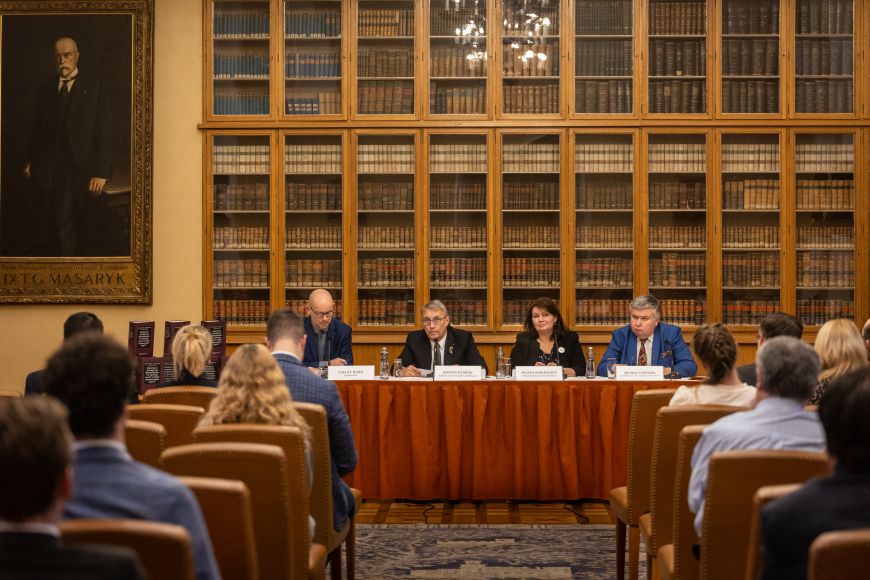The commentary on the Treaty on the Functioning of the European Union, the Treaty on European Union and the EU Charter of Fundamental Rights, published by Wolters Kluwer two years ago, was co-authored by experts in EU law from the law faculties of Czech universities. Vladimír Týč, Filip Křepelka, David Sehnálek and Hana Cejpek Musilová from the Department of International and European Law contributed to the commentary on behalf of Masaryk University.
Michal Tomášek and Václav Šmejkal of Charles University’s Faculty of Law had the idea of translating the commentary into Ukrainian, and the translation was supported by Prime Minister Petr Fiala. The massive 1,780-page publication has now been published and was officially launched at the Carolinum in Prague at the end of February. The translation was co-authored by Danylo Shapoval and Ludmila Yavorska, students at MU Faculty of Law.
“Professor Tomášek and Associate Professor Šmejkal from the Faculty of Law at Charles University, who are behind the Czech commentary, only asked us, the authors, to agree to the translation. But the idea was so great that I wanted to do more than say ‘yes’. I was excited, and I wanted our faculty to be actively involved in the translation. I knew we had talented students from Ukraine studying here, so I approached them and was delighted that they agreed to help,” says David Sehnálek, who coordinated the translation of parts of the commentaries.
The collective work of authors from four universities – Charles University, Masaryk University, Palacký University and the University of West Bohemia – will be distributed free of charge to all interested parties in Ukraine as an expression of Czech support for Ukraine’s EU integration. It provides fundamental EU documents with a thorough and clear explanation of their terminology, legal implications, related legislation and case law. For all persons in Ukraine, including students, the commentary is also available free of charge in electronic form here.

“This year we are celebrating 20 years of Czech membership in the EU, and Ukraine is in a similar situation today as we were 20 years ago. At that time, we did not have the necessary resources on EU law in the Czech language, it was difficult and expensive to access quality foreign resources, and the professional terminology of EU law was not yet established and settled. We hope that our commentary will be of great help to Ukrainian lawyers. On a symbolic level, too, the importance is not to be underestimated. It is a gesture of support for Ukraine’s efforts to prepare for membership in the European Union,” adds David Sehnálek, Vice-Dean of the Faculty of Law for Bachelor’s and Master’s studies.
Danylo Shapoval, a law student, worked on about 400 pages of text. He spent about three months on the translation, most intensively right after the summer term and exam period. “At the beginning, I found the work very difficult because it required extreme concentration to avoid making mistakes in the text. In some places, I came across terms that had no exact equivalent in Ukrainian, in other cases the machine translation made no sense or was missing altogether. However, after two weeks I got used to this style of translation and started to work much more efficiently. I had never translated a text of this length before, but I consider it a great experience and opportunity for me as a student,” Danylo Shapoval recalls.
The text of the Czech commentary is very dense and technical, and difficult to read in the original Czech. This text was then machine-translated into Ukrainian. “You can probably imagine what the output looked like, and the students, including ours, then went through this initial translation, compared it with the original text and edited it into a comprehensible and readable form. They have my admiration. Then the Ukrainian lawyers proofread the text,” says David Sehnálek, describing the translation process.
Danylo Shapoval is convinced that Ukrainian lawyers will welcome the translation. He believes it will also be beneficial for a better understanding of EU law, especially for students and future lawyers.
“By distributing the Commentary free of charge in Ukraine, those who belong to vulnerable groups and cannot afford an expensive book will be able to deepen their knowledge. It will be particularly useful because the commentary covers primary EU law, which is the foundation of the European Union. As a future EU member, Ukraine needs to prepare for membership, and lawyers need to have a full understanding of the EU’s foundations. This book will help us all to do that,” says Danylo Shapoval, explaining the purpose of the translation.
“The values shared by EU member states, such as democracy, the rule of law, human rights and economic development, are fundamental to us all. Through such translations, we can deepen understanding between our cultures and facilitate dialogue between peoples. It is encouraging to see that the Czech Republic is actively engaged in supporting this process and involving law faculties and their students,” concluded Danylo, who also thanked Masaryk University, Charles University and the Czech Republic as a whole for their support of Ukraine and Ukrainian citizens and for hosting refugees.
